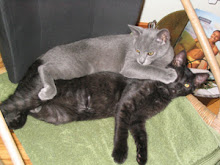Saturday, June 25, 2011
Sunday, June 12, 2011
Saturday, June 11, 2011
Friday, June 10, 2011
99.
Currently, the hardest thing about writing? Letting the wrong words stand there. Because they have to.
99.
Sometimes you need to let the more gelatinous parts stay where they are, with notes all around them. Some pages with a lot of writing and cross outs on them can't actually be rewritten. The new words are just ciphers for "help! help!"
I'm putting those parts aside for now and going forward, trusting that in a month or six, I won't be painting and patching the old sections but instead seeing daylight and knowing where to cut.
I'm putting those parts aside for now and going forward, trusting that in a month or six, I won't be painting and patching the old sections but instead seeing daylight and knowing where to cut.
Wednesday, June 8, 2011
98.
I wonder if the spongiest parts, when rewritten, will end up being the best parts or the most painted-and-patched parts.
I remember reading a scholar on changing acceptable language for race. His point was that we keep changing the name of something because we're still uncomfortable with the concept behind it. That's turning out to be true here, too. I am writing and rewriting the stuff when I'm not comfortable with the feelings that underlie. So the question is whether that will be a matter of rearranging sentences or tossing the whole attempt to see and starting over. .
I remember reading a scholar on changing acceptable language for race. His point was that we keep changing the name of something because we're still uncomfortable with the concept behind it. That's turning out to be true here, too. I am writing and rewriting the stuff when I'm not comfortable with the feelings that underlie. So the question is whether that will be a matter of rearranging sentences or tossing the whole attempt to see and starting over. .
Tuesday, June 7, 2011
Saturday, June 4, 2011
98.
"I did this from love. But of myself? And did I know the difference?"
I think that's the sound of something cracking open, maybe.
I think that's the sound of something cracking open, maybe.
Friday, June 3, 2011
Thursday, June 2, 2011
98.
I know this isn't really the Parallax View, but if one of the things you have to suffer when writing narrative is the release of information -- that is you know a story has to contain certain things -- what you sweat over is initially the order in which everything comes out. Your protagonist is a kid. Should you mention he's good to his parents and has a dog before you mention he's robbing banks? That probably makes a difference. And there's other information: shirt color vs. how tall he is -- whose ordering actually has no import.
Then the alchemy begins: information that's crucial to the story can, when you have enough there already, not be mentioned at all. That Hemingway riff: "For sale, baby shoes, never worn," the rest of the story comes into your head without needing the rest. The point is in trusting the contract between reader and yourself. The contract is harder every day there's an internet, because the synapses used to fire off those particular connections are now keeping multiple windows open and seeing if anyone hot has emailed you. (You kids off my lawn. Now.)
Further, people tend to read differently. You can mention someone's Liberty of London tie 800 times and some readers will have the association you want, others will hold the character up to a totally different set of prejudices and many won't have a clue what it means.
And the current issue: there's what you know now and what you knew then and all the opinions that happened in between.
Then the alchemy begins: information that's crucial to the story can, when you have enough there already, not be mentioned at all. That Hemingway riff: "For sale, baby shoes, never worn," the rest of the story comes into your head without needing the rest. The point is in trusting the contract between reader and yourself. The contract is harder every day there's an internet, because the synapses used to fire off those particular connections are now keeping multiple windows open and seeing if anyone hot has emailed you. (You kids off my lawn. Now.)
Further, people tend to read differently. You can mention someone's Liberty of London tie 800 times and some readers will have the association you want, others will hold the character up to a totally different set of prejudices and many won't have a clue what it means.
And the current issue: there's what you know now and what you knew then and all the opinions that happened in between.
Wednesday, June 1, 2011
98.
There is a taxonomy of naps. You'd think the subtyping relies on measuring quality of refreshment, but I don't think so. The 20 minute nap, the deeper 60 minute nap, and then the utterly useless 2-hour, face-down, sweaty two hour nap after which you think you might still need to sleep, and when you wake up, the sheet creases on your face look like scarification. Obviously, that nap was too heavy.
I had this vision: diving into a lake, and arching perfectly so you head to a perfect depth at which you weigh nothing and your motion is effortless. The return to the surface feels pre-ordained.
Now that's the platonic nap.
And, if the water might be words, it's the platonic chapter.
I had this vision: diving into a lake, and arching perfectly so you head to a perfect depth at which you weigh nothing and your motion is effortless. The return to the surface feels pre-ordained.
Now that's the platonic nap.
And, if the water might be words, it's the platonic chapter.
Subscribe to:
Comments (Atom)





